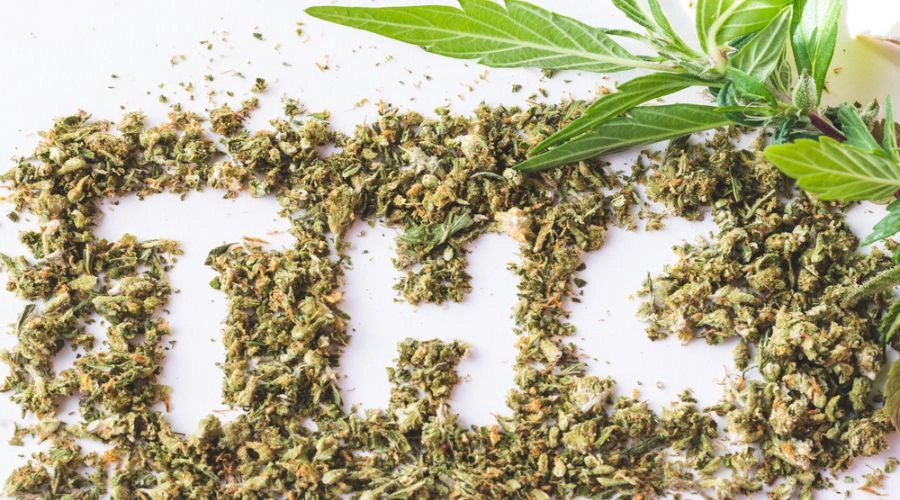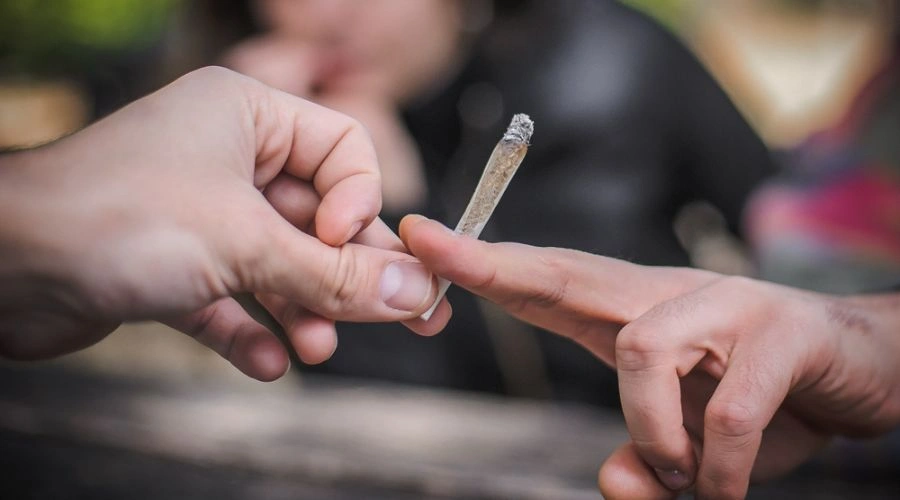The Risk of Developing Weed Shakes After Consuming Cannabis
Have you ever started to shake or tremble after smoking weed? It totally makes sense that these involuntary muscle movements would catch you off guard.
In turn, you might ask, “Why do I shake when I smoke weed?”
It might seem like a strange connection. However, “weed shakes” are a real thing. Despite the fact that recreational and medical cannabis use have become more popular over the years, it does not mean that weed is without risks. So, what should you know?
First, let’s talk about the possible causes of weed shakes. Then, we’ll discuss other information you might want to know, like whether cannabis shakes are dangerous, other risks of marijuana use, and how Ingrained Recovery can help.
What Causes Weed Shakes?

“Weed shakes” refer to involuntary muscle tremors that occur after you use weed. You can develop weed shakes no matter how you consume the drug. Whether you smoke or take edibles, there are several possible reasons for cannabis-induced tremors.
Possible causes of weed shakes include:
Overconsumption of THC
Tetrahydrocannabinol, or THC, is the main psychoactive compound in marijuana. Most of the time, weed shakes are the result of consuming a high amount of THC in a short period. Large doses of THC can overwhelm your nervous system, leading to shaking and other unpleasant symptoms.
Low Blood Sugar Levels
Some people shake when they experience low blood sugar. If your blood sugar drops (whether you are high or not), you may start to shake. If you smoke weed or take edibles on an empty stomach, this might be what’s going on. People with pre-existing medical conditions like diabetes might be more prone to low blood sugar levels.
Changes in Body Temperature
There’s limited research on the connection between cannabis and body temperature. Still, some people do notice changes in body temperature after cannabis consumption. Similar to low blood sugar, low body temperature can cause shivering and involuntary tremors.
Anxiety and Overstimulation
Even though a lot of people use weed to reduce anxiety, cannabis can and often does cause heightened anxiety. Weed can also trigger paranoia and panic attacks. Sometimes, people experience physical responses, like shaking, as a result of anxiety. This goes along with the effects of THC on the central nervous system and amygdala.
Are Weed Shakes Dangerous?
Are weed shakes dangerous? Most of the time, no. They can be uncomfortable, but muscle spasms and tremors caused by weed are not life-threatening cannabis effects. In the majority of cases, weed shakes are an indicator that you’re using higher doses of THC than your body can handle.
Get Proven Weed Detox and Rehab Options
Find Help At Ingrained Recovery
When to Seek Medical Attention for Weed Shakes
There are times when involuntary shaking could indicate a bigger problem. Severe symptoms such as the following may require medical intervention.
- Delusions, hallucinations, paranoia.
- Loss of consciousness.
- Severe shaking that does not end.
- High blood pressure.
- Dizziness or fainting.
- Trouble breathing.
- Confusion.
- Chest pain.
Make sure that you are honest with the healthcare professional you see about cannabis consumption and any other drugs you use. It is also important to tell them about any underlying health conditions.
How to Manage Weed Shakes

If you experience weed shakes, you might wonder what to do about them. Here are some of the things people often try to get through or prevent weed shakes.
- Use products with less THC. Since too much cannabis, but specifically, too much THC, is the main cause of weed shakes, some people trade their current products for those with lower amounts of THC to alleviate symptoms like weed tremors. For example, products that are more dominant in CBD, the non-psychoactive compound of cannabis.
- Eat before you use cannabis. Eating balanced meals and snacks can help you avoid shakes caused by low blood sugar.
- Try relaxation techniques. Practicing relaxation techniques can help you reduce feelings of anxiety and muscle tension. For example, progressive muscle relaxation and breathing exercises.
- Move around. Some people find that light physical activity, like getting up to walk around, helps when they are experiencing the “weed shakes.”
- Change your environment. If you are cold or anxious, moving to a warmer or less stimulating location might help.
- Stop using cannabis. The best way to get rid of the weed shakes for good is to stop using cannabis. When you don’t use weed, you aren’t at risk of cannabis shakes–or any other negative consequences of using weed–at all.
Cannabis products sold in dispensaries often contain more THC than they used to. The newfound prevalence of higher-potency products increases the chance of THC overconsumption, potentially leading to involuntary muscle spasms and other risks.
Get Accredited Treatment at Ingrained
Find Help At Ingrained Recovery
The Realities and Risks of Marijuana Use
Cannabis is one of the most widely used recreational drugs, but that does not mean that it cannot cause harm.
Aside from weed shakes, what are the risks associated with cannabis? There are long-term and short-term risks of marijuana use that it’s important to shed light on.
Possible risks of marijuana use include but aren’t limited to:
- Cannabis addiction. About three in 10 (33%) of people who use cannabis are said to develop some form of a cannabis use disorder, which is the formal name for cannabis abuse or addiction. Those who start using weed at a younger age are at an increased risk of a marijuana use disorder.
- Brain health. Weed affects your brain function directly. People who use weed may experience slowed reaction time and differences in working memory, attention, learning, decision-making, and coordination.
- Cannabis Hyperemesis Syndrome. There is a condition called CHS (cannabinoid hyperemesis syndrome) that can cause severe nausea, vomiting, and other symptoms, like abdominal pain. CHS tends to affect long-term cannabis users.
- New or worsened psychiatric problems. We talked about how weed can cause or worsen anxiety; this is just one example of how the drug can affect your mental health. It’s critical to be aware of how marijuana is affecting your mental well-being, especially if you’re a regular cannabis user.
- Effects on lung health. Some potential risks of cannabis have to do with consumption methods. If you smoke or vape any drug, including weed, it can have negative impacts on your lung health.
While weed shakes are temporary reactions, other implications of cannabis use can affect your life in the long term. If you have trouble quitting weed, know it is 100% possible to do so. Getting treatment for cannabis addiction can help.
Knowing the Signs of Cannabis Addiction

Not all cannabis users develop an addiction to the drug. That said, it’s marijuana addiction is not something to disregard. Knowing the signs of cannabis addiction makes it possible to detect them in yourself or someone else in your life.
Here are some things to look out for.
- Consuming cannabis continually even though it causes interpersonal problems (e.g., problems in friendships, familial relationships, or romantic partnerships).
- Experiencing cannabis withdrawal symptoms when you stop or cut down (or using cannabis to avoid or treat withdrawals).
- Developing a tolerance (needing to use higher amounts of cannabis to achieve the desired effects).
- Giving up or spending less time on important social activities or hobbies because of cannabis use.
- Using cannabis in dangerous situations repeatedly (e.g., driving a car after using cannabis).
- Trouble fulfilling responsibilities at work, school, or home due to cannabis use.
- Unsuccessful efforts to cut down on, control, or stop using weed.
- Using cannabis in large amounts or for longer than intended.
- Drug cravings (a strong urge to use cannabis).
Cannabis use disorder can lead to serious consequences, such as financial and legal repercussions, that can get worse if they aren’t addressed. Seeking treatment means that you can avoid new or worsened risks resulting from marijuana addiction.
Our Cannabis Addiction Treatment Programs in Georgia
With a range of treatment options available, our recovery center in Georgia is an ideal choice for those seeking help for cannabis addiction and other mental or behavioral health concerns.
Programs offered at Ingrained Recovery include:
- Drug and alcohol detox.
- Residential inpatient treatment.
- Dual-diagnosis disorder treatment.
- Couples rehab.
The programs at Ingrained Recovery are covered by most forms of health insurance. You can verify your coverage for cannabis addiction treatment or learn more about our programs by calling our admissions line now.
Call Ingrained for Help With Weed Shakes and Cannabis Recovery

Continuing to use weed despite adverse effects like cannabis shakes is one of many possible indicators of cannabis addiction you might notice in yourself or someone you care about. If you think that you or someone you know has a problem, we’re here to help.
Ingrained Recovery is an addiction and dual-diagnosis treatment center in Eastman, Georgia, with effective programs for cannabis use disorders. We welcome individuals coming from in and outside of the state who are seeking help for cannabis abuse and other forms of substance abuse.
Please call Ingrained Recovery for help overcoming weed shakes and cannabis recovery today. Our phone line is available 24/7. All calls to Ingrained Recovery are confidential and with obligations to attend treatment, so please reach out to get support now.
Up To 100% of Rehab Covered By Insurance
Find Help At Ingrained Recovery
FAQs About Weed Shakes
Why do people shake after smoking?
Getting too high (consuming too much THC) for your body can overwhelm the nervous system. Some factors can increase the likelihood that you’ll shake after smoking weed. These include:
- Underlying health issues.
- Excessive consumption of cannabis.
- Environmental factors (e.g., cold temperatures).
Low blood sugar can also cause shaking. If you experience low blood sugar, it is essential to address it immediately.
How long do weed shakes last?
Weed shakes tend to stop about 20 to 30 minutes after they start, but they may last for hours in some cases. Factors like how much cannabis you take could make a difference in how long weed shakes last.
Can you overdose on weed?
Yes. Marijuana is very unlikely to kill you, but it is possible to take too much. Weed overdose is also called cannabis poisoning, and it is a known risk of cannabis consumption. People who use high-potency products, like edibles, are the most likely to experience cannabis poisoning.
References
- https://www.ncbi.nlm.nih.gov/books/NBK563174/
- https://www.cdc.gov/cannabis/health-effects/index.html
- https://pmc.ncbi.nlm.nih.gov/articles/PMC6915047/
- https://my.clevelandclinic.org/health/diseases/21665-cannabis-hyperemesis-syndrome
- https://my.clevelandclinic.org/health/articles/4392-marijuana-cannabis
- https://www.cdc.gov/cannabis/health-effects/poisoning.html

